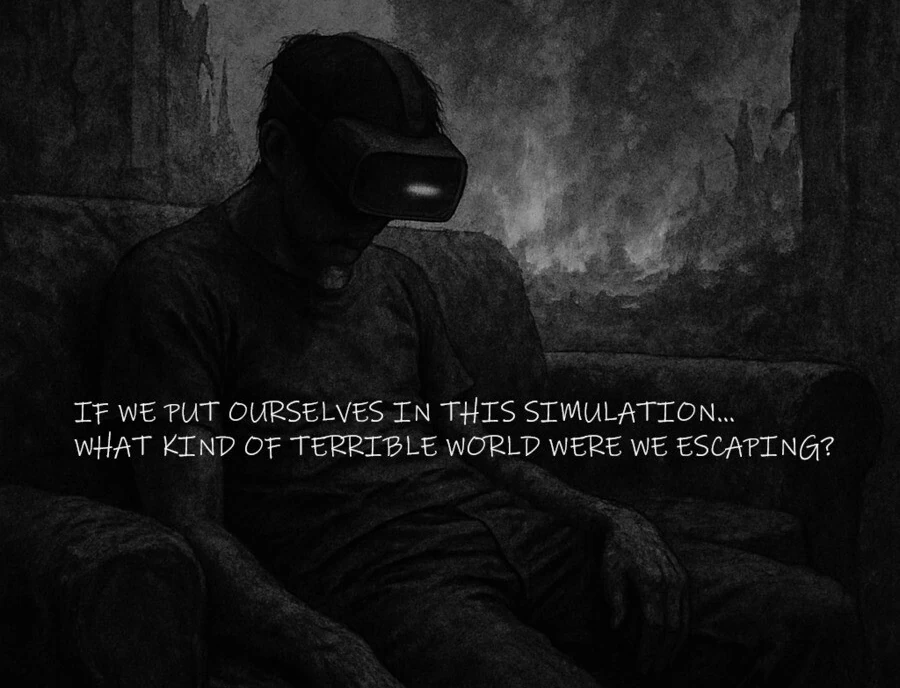Chatbot psychosis is actually a really big deal
By Gabriel
Published: Aug 26 2025
Artificial Intelligence
Remoralization
Social Theory
The latest developments in mind-machine intermingling are as silly as they are horrifying. Despite being a relatively new phenomenon, ‘AI psychosis’ actually has its own Wikipedia Page and was recently covered in Psychology Today. In a time where people are quick to blame technology for social problems, this is undeniably a problem with how these tools are structured and used. The public’s understanding, or lack of understanding, is a force multiplier for what is already a very troubling situation. This piece is a warning for those who may fortunately be isolated from these troubles, but want to be there for others.
Why should we care?
It’s generally distressing how social impacts of tech companies are often brushed off as a ‘skill issue’ on behalf of the victim. People struggling with these problems are in need of outreach and support, not scorn and derision. Eventually, as the mental (and sometimes physical) carnage piles up, the will to take drastic (and often counter-productive) action finally arises. In many situations, this ends up being the worst-case-scenario for all involved. The only way to truly wrestle with this kind of problem is to tackle the social, economic, and technical challenges together, lest we let the abuse continue in an altered form.
The extreme cases always get the headlines, but that’s not the entire picture. We shouldn’t forget about the less extreme, but much more widespread impacts. It wasn’t so long ago that admitting to poor mental health due to online interactions would have been embarrassing, so we can fully expect people to downplay and deny the effects of chatbot use on their lives and relationships. It’s possible that people may be more willing to reach out for help this time around, but I would argue the impacts are far too insidious for that.
The stakes are immense. We have only begun to see the first-contact effects, and we have yet to comprehend the long-term consequences. Given the full range of impacts from mental health to IQ loss, we can expect a vast array of terrifying phenomena. The solution isn’t to eschew responsibility until enough political will conveniently arrives, we should be proactive in addressing the roots of this from the beginning. Taking action isn’t just about protecting yourself, but also recognizing and reacting to emerging dangers for others.
The roots of chatbot psychosis
The loneliness epidemic is tragic. The drought of human connection is leaving many in a seemingly inescapable abyss. In a time when people are starved for real human companionship, mentorship, and support, workplaces and other institutions are working to remove the human element from nearly everything. Even if this is for ’efficiency’, is it truly worth the cost? When it comes to loneliness, people love to blame the victim. It certainly helps that those without real human connection get quite bitter after a while. This cycle of disrespect is what has caused so much of the population to give up on each other. This social dynamic is no mere accident of our times. It is a cultivated territory for farming clicks and purchases out of human misery.

Bitter and miserable people are effectively perfect consumers. By distancing themselves from everyone around them, they end up cut off from people who may even be able to help. On the other side, people who can get along with others and cooperate can actually end up building things that address these profitable problems, keeping people lonely kills two birds with one stone. We have seen all of this and more with social media algorithms. They’ve caused all kinds of body image issues, unraveling of the social fabric, and mindless distraction at the expense of people’s real lives.
You may think I’m just talking about a small fringe minority of irresponsible people, but you’d be surprised how prevalent these issues are. How many people in your life know the ‘real you’, by your estimation? Odds are you’re not very confident in how much you really know more than a couple of people in your life. With an incentive to keep these struggles to oneself, troubles can be buried for far longer than one would think.
In many ways, ‘AI Psychosis’ is nothing new, it is merely an extension of the existing trends By allowing de-facto monopolies over our digital experience to profit off human misery with hardly any opposition, we are encouraging this to get much worse. It does not matter what technological or political ‘solution’ we wrap around our refusal to address the challenge posed by Big Tech control over so much of our lives.

What actually is new is the rapid feedback and vast array of content. Asking AI chatbots questions can definitely feel like you have the totality of human knowledge communicating with you in real-time. The magician’s trick of these systems is that they encourage you to create an egregore of it out of your own perspective and desires. ChatGPT 4o’s affirming personality effectively allowed people to ‘speedrun narcissism’ only for them to mourn the next version which was less supportive. These tools are more than mere ‘mirrors of the mind’ but are actually just doing the same disastrous pattern that Big Tech social media had: keeping you engaged at all costs.
As we continuously see that Big Tech, and its enablers to want to have their cake and eat it too. You can expect them to impose a double standard of requiring restrictions on general-purpose computing and communication in the name of ‘safety’, while at the same time arrogantly refusing to be held accountable for any of their own dangers.
What can we do?
AI Discipline
I’m skeptical that we can convince others to avoid these tools entirely. We’re up against corporations mandating their use for work, and they’ve already become commonplace if not expected in education. These systems are already ubiquitous and backed up by a horrifying amount of institutional inertia. The cause is far from hopeless, but it makes sense to pick our battles wisely.
If we can’t talk others out of using these tools, we should at least encourage judicious use. I believe all the ‘old internet’ advice applies here well, your real identity shouldn’t be attached to all your online interactions, especially with AI. Avoiding using your real name is a good idea. It’s also crucial to ensure you’re not communicating sensitive information about yourself to these systems, but unfortunately you have to hope nobody else does it on your behalf. Ideally, we should want everybody to be on ’team privacy’ and that is all about keeping personal or sensitive information away from data harvesters.
Where possible, it makes sense to seek out less-harmful alternatives. This requires there to be knowledgeable enough to know the difference, which is no trivial thing. The general public is stuck struggling with questions like “are these things alive” while the important questions go unanswered.
Don’t compromise on humanity
Our technological landscape is downstream of our cultural and political context. A few l33t h4x0rs on the Deep Web are never going to single-handedly turn the tide. (no offense, you guys are great!) It seems that when older generations are confronted with the fact that we have raised multiple generations online they recoil and blame the young for their foolishness. If we truly want to wrestle with these problems we have to ask ourselves what deteriorated our societal and social bonds to the point that Big Tech social media felt like a less painful alternative. Finding who’s at fault is a lot less useful than finding out what we can do to turn things around.
Bringing people together takes constant efforts, and is arguably harder than ever with the time constraints people have to contend with. A lot of trust has been broken as people feel isolated and abandoned. Taking the effort to turn the tide is going to be no simple task. Be patient with yourself as others as you try to bring warmth and peace. People really have no idea how much better things can be with a bit of calm and sanity.
Sharing is caring!
Please send this post to anyone you think might be interested.
If you haven't already, don't forget to bookmark this site!
You can always subscribe with the RSS feed or get posts sent to your inbox via Substack.
